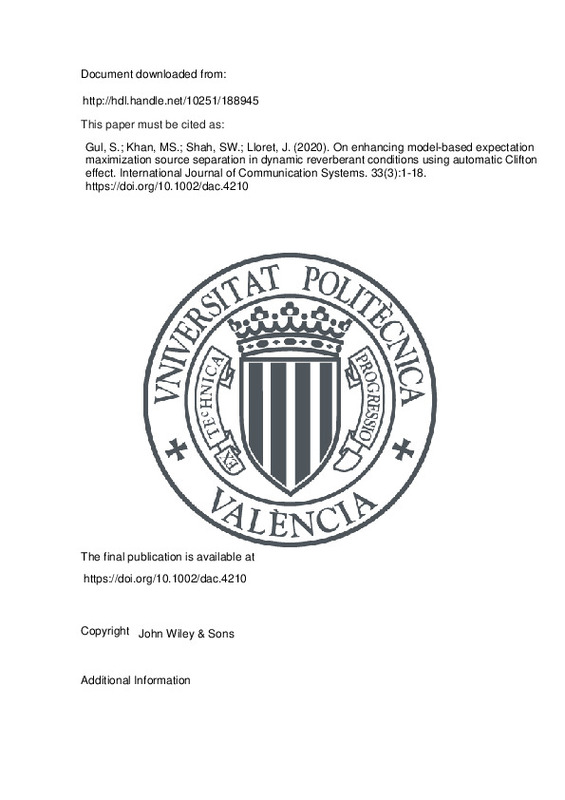JavaScript is disabled for your browser. Some features of this site may not work without it.
Buscar en RiuNet
Listar
Mi cuenta
Estadísticas
Ayuda RiuNet
Admin. UPV
On enhancing model-based expectation maximization source separation in dynamic reverberant conditions using automatic Clifton effect
Mostrar el registro sencillo del ítem
Ficheros en el ítem
| dc.contributor.author | Gul, Sania
|
es_ES |
| dc.contributor.author | Khan, Muhammad Salman
|
es_ES |
| dc.contributor.author | Shah, Syed Waqar
|
es_ES |
| dc.contributor.author | Lloret, Jaime
|
es_ES |
| dc.date.accessioned | 2022-10-31T10:56:17Z | |
| dc.date.available | 2022-10-31T10:56:17Z | |
| dc.date.issued | 2020-02 | es_ES |
| dc.identifier.issn | 1074-5351 | es_ES |
| dc.identifier.uri | http://hdl.handle.net/10251/188945 | |
| dc.description.abstract | [EN] Source separation algorithms based on spatial cues generally face two major problems. The first one is their general performance degradation in reverberant environments and the second is their inability to differentiate closely located sources due to similarity of their spatial cues. The latter problem gets amplified in highly reverberant environments as reverberations have a distorting effect on spatial cues. In this paper, we have proposed a separation algorithm, in which inside an enclosure, the distortions due to reverberations in a spatial cue based source separation algorithm namely model-based expectation-maximization source separation and localization (MESSL) are minimized by using the Precedence effect. The Precedence effect acts as a gatekeeper which restricts the reverberations entering the separation system resulting in its improved separation performance. And this effect is automatically transformed into the Clifton effect to deal with the dynamic acoustic conditions. Our proposed algorithm has shown improved performance over MESSL in all kinds of reverberant conditions including closely located sources. On average, 22.55% improvement in SDR (signal to distortion ratio) and 15% in PESQ (perceptual evaluation of speech quality) is observed by using the Clifton effect to tackle dynamic reverberant conditions. | es_ES |
| dc.description.sponsorship | This project is funded by Higher Education Commission (HEC), Pakistan, under project no. 6330/KPK/NRPU/R&D/HEC/2016. | es_ES |
| dc.language | Inglés | es_ES |
| dc.publisher | John Wiley & Sons | es_ES |
| dc.relation.ispartof | International Journal of Communication Systems | es_ES |
| dc.rights | Reserva de todos los derechos | es_ES |
| dc.subject | Blind source separation | es_ES |
| dc.subject | Clifton effect | es_ES |
| dc.subject | Dynamic acoustic conditions | es_ES |
| dc.subject | Precedence effect | es_ES |
| dc.subject | Reverberation | es_ES |
| dc.subject.classification | INGENIERIA TELEMATICA | es_ES |
| dc.title | On enhancing model-based expectation maximization source separation in dynamic reverberant conditions using automatic Clifton effect | es_ES |
| dc.type | Artículo | es_ES |
| dc.identifier.doi | 10.1002/dac.4210 | es_ES |
| dc.relation.projectID | info:eu-repo/grantAgreement/HEC//6330%2FKPK%2FNRPU%2FRD%2FHEC%2F2016/ | es_ES |
| dc.rights.accessRights | Abierto | es_ES |
| dc.contributor.affiliation | Universitat Politècnica de València. Departamento de Comunicaciones - Departament de Comunicacions | es_ES |
| dc.description.bibliographicCitation | Gul, S.; Khan, MS.; Shah, SW.; Lloret, J. (2020). On enhancing model-based expectation maximization source separation in dynamic reverberant conditions using automatic Clifton effect. International Journal of Communication Systems. 33(3):1-18. https://doi.org/10.1002/dac.4210 | es_ES |
| dc.description.accrualMethod | S | es_ES |
| dc.relation.publisherversion | https://doi.org/10.1002/dac.4210 | es_ES |
| dc.description.upvformatpinicio | 1 | es_ES |
| dc.description.upvformatpfin | 18 | es_ES |
| dc.type.version | info:eu-repo/semantics/publishedVersion | es_ES |
| dc.description.volume | 33 | es_ES |
| dc.description.issue | 3 | es_ES |
| dc.relation.pasarela | S\473138 | es_ES |
| dc.contributor.funder | Higher Education Commission, Pakistan | es_ES |







![[Cerrado]](/themes/UPV/images/candado.png)

